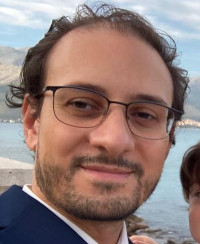RobOntics 2023
The fourth edition of the International Workshop on Ontologies for Autonomous Robotics (ROBONTICS) took place under the umbrella of the IEEE RO-MAN 2023 Conference in Busan, Korea as a hybrid event – online participation was also possible.
While a broad selection of topics was open to contributors, of particular interest were contributions looking into the problem of modeling culture and social scenarios (broadly understood) via ontology and other knowledge representation techniques.
The important dates were as follows:
- Submission deadline: July 7, 2023
- Notification: July 22, 2023
- Camera ready version: August 14, 2023
- Workshop: August 28, 2023
Organisers
- Stefano Borgo, Laboratory for Applied Ontology (LOA), ISTC CNR, Trento, Italy
- Aldo Gangemi, University of Bologna and ISTC-CNR, Italy
- Robert Porzel, Digital Media Lab, University of Bremen, Germany
- Daniel Beßler, Institute for Artificial Intelligence, University of Bremen, Germany
- Mihai Pomarlan, Faculty of Linguistics, University of Bremen, Germany
- Mohammed Diab, Personal Robotics Laboratory, Imperial College London, UK
Scientific Committee
- Mona Abdel-Keream, Institute for Artificial Intelligence, University of Bremen, Germany.
- Kaviya Dhanabalachandran, Institute for Artificial Intelligence, University of Bremen, Germany.
- Daniele Francesco Santamaria, Department of Mathematics and Informatics, University of Catania, Italy
- Stefano de Giorgis, Department of Philosophy and Communication Studies, University of Bologna, Italy.
- Alina Hawkin, Institute for Artificial Intelligence, University of Bremen, Germany.
- Sascha Jongebloed, Institute for Artificial Intelligence, University of Bremen, Germany.
- Robin Nolte, Digital Media Lab, University of Bremen, Germany.
Invited speakers

Alessandra Sciutti
Alessandra Sciutti is a Tenure Track Researcher, head of the CONTACT (COgNiTive Architecture for Collaborative Technologies) Unit of the Italian Institute of Technology (IIT). She received her B.S and M.S. degrees in Bioengineering and the Ph.D. in Humanoid Technologies from the University of Genova in 2010. After two research periods in USA and Japan, in 2018 she has been awarded the ERC Starting Grant wHiSPER (www.whisperproject.eu), focused on the investigation of joint perception between humans and robots. She published more than 80 papers and abstracts in international journals and conferences and participated in the coordination of the CODEFROR European IRSES project (https://www.codefror.eu/). She is currently Associate Editor for several journals, among which the International Journal of Social Robotics, the IEEE Transactions on Cognitive and Developmental Systems and Cognitive System Research. The scientific aim of her research is to investigate the sensory and motor mechanisms underlying mutual understanding in human-human and human-robot interaction.
Talk: “Cognitive robotics for mutual understanding in HRI”
Abstract: Creating robots that can effectively interact with humans involves empowering them to build and sustain a precise understanding of human beings. This necessitates the robot’s capacity to comprehend human needs, desires, and intentions, while also exhibiting clear and comprehensible behavior. Additionally, it requires the ability to anticipate the outcomes of its actions and those of others, learning to adjust to dynamic conditions, and autonomously choosing appropriate behavior. Drawing inspiration from human cognitive development, we discuss how these skills can be integrated into the design of cognitive robots, significantly enhancing their capacity to interact effectively with humans.

Alessandro Umbrico
Alessandro Umbrico (M.S. Engineering Computer Science 2012, Ph.D. Computer Science and Automation, 2017) is a researcher at the Institute of Cognitive Sciences and Technologies of CNR (CNR-ISTC), Rome, Italy. His research topics cover the development of AI-based planning and execution techniques in Human-Robot Interaction (HRI) scenarios. He investigates the integration of knowledge representation and planning for the design of novel cognitive-inspired control approaches supporting contextualized and adaptive interactions between humans and robots. He contributed to a number of research projects addressing HRI issues for healthcare assistance and collaborative manufacturing. Concerning manufacturing, he participated in the H2020 research projects FourByThree and ShareWork (H2020 Factories of the Future). A parallel thread concerns the development of AI-based technologies for healthcare assistance. He participated in several projects e.g., AAL EU Projects EasyReach, MAESTRO, TV-AssistDem, and the ESA Project SmartSatCare. These projects represented valuable experience in gathering requirements from different stakeholders (e.g., end-users, and healthcare professionals) and designing AI-based services taking into account the different perspectives and needs.
Talk: “Ontology-Enhanced Control for Effective Human-Robot Interaction”
Abstract: Autonomous robots acting in working and social contexts require the development of cognitive capabilities necessary to realize adaptive, contextualized, and safe behaviors. Artificial Intelligence (AI) technologies well-support the implementation of relevant capabilities e.g., decision-making, knowledge representation, problem-solving, or learning. The synergetic integration of heterogeneous AI technologies is crucial to endow robots with a “mind” and combine the functions of cognition necessary to realize effective behaviors. This talk discusses recent results integrating ontology and timeline-based task-planning techniques within a novel control architecture inspired by the Dual Process Theory. The distinction between fast and slow reasoning processes in particular guides the integration of AI modules that reason at different levels of abstraction and “time scales” supporting the needed levels of reactivity and deliberation. The talk discusses applications of the proposed concepts in healthcare assistance and collaborative manufacturing entailing continuous and adaptive interactions between a human and a robot.
Accepted Papers
The following papers have been accepted for the proceedings of RobOntics 2023:
-
Lorenza Saettone, Riccardo Fedriga and Emanuele Micheli: Linguistic and Cultural Competencies in Dynamic Possible Worlds
-
Seungwan Woo, Jeongseok Kim and Kangjin Kim: We, Vertiport 6, are temporarily closed: Interactional Ontological Methods for Changing the Destination
-
Florent Leoty, Jona Thai, Bernard Archimede, Philippe Fillatreau and Michael Gruninger: Using Mereotopology for Automated Spatial Inference in Task and Motion Planning
-
Yunpiao Bai, Jona Thai and Michael Gruninger: An Ontological Analysis of Robot Path Planning Problems
-
Francesca Stramandinoli, Amit Bhatia, Wenping Zhao, Brigid Blakeslee, Alex Shilov, Jeff Mendoza, Pradeep Rajendran and Satyandra Kumar Gupta: A Knowledge-driven Approach for Human-Robot Collaborative Manufacturing
-
Rodrigo Bernardo, João Sousa and Paulo Goncalves: Ontological framework to improve motion planning of manipulative agents through semantic knowledge-based reasoning
-
Muhammad Raza Naqvi, Arkopaul Sarkar, Sina Namaki Arghi, Farhad Ameri and Hedi Karray: Application of MSDL in modeling capabilities of robots
-
Mona Abdel-Keream, Daniel Beßler, Ayden Janssen, Sascha Jongebloed, Robin Nolte, Mihai Pomarlan and Robert Porzel: An Ontological Model of User Preferences
-
Mark Adamik and Stefan Schlobach: Towards a Definition and Conceptualisation of the Perceived-Entity Linking Problem
-
Mark Adamik and Taewoon Kim: Don’t touch my stuff: Towards commonsense reasoning about object ownership for embodied agents
-
Petr Vanc, Karla Stepanova and Daniel Bessler: Ontological Context for Gesture Interpretation
Programme
Date: 28th of August, 2023
Venue: Room A (Sicily Room, 1st Floor), and online via zoom.
For online presenters: we requested a prerecorded version of the presentation to be made available before the workshop start time (e.g., by emailing one of the organizers a link to where they can download the video from). This was to have a backup in case internet connections were poor that day.
Participation in the workshop required a RO-MAN Workshops and Tutorials registration. This was obtainable from the RO-MAN website.
The schedule is provided below. All times in Korea Standard Time (GMT+9).
Morning Session: “Human-Robot Interaction”
- 09:00 - 10:00 invited talk Alessandra Sciutti (COgNiTive Architecture for Collaborative Technologies Unit of the Italian Institute of Technology (IIT), Italy)
- 10:00 - 10:15 Simone De Martino, Marianna Nicolosi-Asmundo, Stefano Angelo Rizzo and Daniele Francesco Santamaria: Modeling the video game environment: the VideOWL ontology
- 10:15 - 10:30 Petr Vanc, Karla Stepanova and Daniel Bessler: Ontological Context for Gesture Interpretation
- 10:30 - 10:45 coffee break
- 10:45 - 11:00 Lorenza Saettone, Riccardo Fedriga and Emanuele Micheli: Linguistic and Cultural Competencies in Dynamic Possible Worlds
- 11:00 - 11:15 Mona Abdel-Keream, Daniel Beßler, Ayden Janssen, Sascha Jongebloed, Robin Nolte, Mihai Pomarlan and Robert Porzel: An Ontological Model of User Preferences
- 11:15 - 11:30 Mark Adamik and Taewoon Kim: Don’t touch my stuff: Towards commonsense reasoning about object ownership for embodied agents
- 11:30 - 11:45 Mark Adamik and Stefan Schlobach: Towards a Definition and Conceptualisation of the Perceived-Entity Linking Problem
Afternoon Session: “Robot Manipulation and Planning”
- 13:30 - 14:30 invited talk Alessandro Umbrico (Institute for Cognitive Science and Technologies (ISTC), National Research Council (CNR), Italy)
- 14:30 - 14:45 Florent Leoty, Jona Thai, Bernard Archimede, Philippe Fillatreau and Michael Gruninger: Using Mereotopology for Automated Spatial Inference in Task and Motion Planning
- 14:45 - 15:00 Yunpiao Bai, Jona Thai and Michael Gruninger: An Ontological Analysis of Robot Path Planning Problems
- 15:00 - 15:15 coffee break
- 15:15 - 15:30 Francesca Stramandinoli, Amit Bhatia, Wenping Zhao, Brigid Blakeslee, Alex Shilov, Jeff Mendoza, Pradeep Rajendran and Satyandra Kumar Gupta: A Knowledge-driven Approach for Human-Robot Collaborative Manufacturing
- 15:30 - 15:45 Seungwan Woo, Jeongseok Kim and Kangjin Kim: We, Vertiport 6, are temporarily closed: Interactional Ontological Methods for Changing the Destination
- 15:45 - 16:00 Rodrigo Bernardo, João Sousa and Paulo Goncalves: Ontological framework to improve motion planning of manipulative agents through semantic knowledge-based reasoning
- 16:00 - 16:15 Muhammad Raza Naqvi, Arkopaul Sarkar, Sina Namaki Arghi, Farhad Ameri and Hedi Karray: Application of MSDL in modeling capabilities of robots
Invited talks lasted up to 45 minutes and were followed by a 15 minute discussion. Each oral presentation of a contributed paper lasted up to 10 minutes and was followed by a 5 minute discussion.